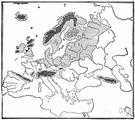ice age
n.
1. A cold period marked by extensive glaciation.
2. Ice Age The most recent glacial period, which occurred during the Pleistocene Epoch.
American Heritage® Dictionary of the English Language, Fifth Edition. Copyright © 2016 by Houghton Mifflin Harcourt Publishing Company. Published by Houghton Mifflin Harcourt Publishing Company. All rights reserved.
ice age
n
(Geological Science) another name for glacial period
Collins English Dictionary – Complete and Unabridged, 12th Edition 2014 © HarperCollins Publishers 1991, 1994, 1998, 2000, 2003, 2006, 2007, 2009, 2011, 2014
ice′ age`
n.
1. (often caps.) the geologically recent Pleistocene Epoch, during which much of the Northern Hemisphere was covered by great ice sheets.
2. any one of the Permian, Carboniferous, Cambrian, or Precambrian glaciations.
[1870–75]
Random House Kernerman Webster's College Dictionary, © 2010 K Dictionaries Ltd. Copyright 2005, 1997, 1991 by Random House, Inc. All rights reserved.
ice age
1. Any of several cold periods during which glaciers covered much of the Earth.
2. Ice Age The most recent glacial period, which occurred during the Pleistocene Epoch and ended about 10,000 years ago. During the Pleistocene Ice Age, great sheets of ice up to two miles thick covered most of Greenland, Canada, and the northern United States as well as northern Europe and Russia.
The American Heritage® Student Science Dictionary, Second Edition. Copyright © 2014 by Houghton Mifflin Harcourt Publishing Company. Published by Houghton Mifflin Harcourt Publishing Company. All rights reserved.
Ice Age
1. A period during which glaciers advanced to cover large parts of the earth’s surface, the most recent occurring over 11,000 years ago.
2. A time when ice sheets covered much of the Earth. The present Ice Age is only one of several ice ages.
Dictionary of Unfamiliar Words by Diagram Group Copyright © 2008 by Diagram Visual Information Limited
ThesaurusAntonymsRelated WordsSynonymsLegend:
| Noun | 1. |  ice age - any period of time during which glaciers covered a large part of the earth's surface; "the most recent ice age was during the Pleistocene" ice age - any period of time during which glaciers covered a large part of the earth's surface; "the most recent ice age was during the Pleistocene"geological period, period - a unit of geological time during which a system of rocks formed; "ganoid fishes swarmed during the earlier geological periods" prehistoric culture, prehistory - the time during the development of human culture before the appearance of the written word |
Based on WordNet 3.0, Farlex clipart collection. © 2003-2012 Princeton University, Farlex Inc.
Translations
العَصْر الجَليدي
doba ledová
istid
jääaeg
jääkausi
jégkorszak
ísöld
doba ľadová
ledena doba
buzul çağı
Ice Age
n the Ice Age → l'era glacialeCollins Italian Dictionary 1st Edition © HarperCollins Publishers 1995
ice
(ais) noun1. frozen water. The pond is covered with ice.
2. an ice-cream. chocolate ice-cream. Three ices, please.
3. (American) a fruit-flavoured frozen dessert usually made without milk and cream. lemon ice(s).
verb to cover with icing. She iced the cake.
ˈicing noun a mixture of sugar, white of egg, water etc used to cover or decorate cakes.
ˈicy adjective1. very cold. icy winds.
2. covered with ice. icy roads.
3. unfriendly. an icy tone of voice.
ˈicily adverbˈiciness noun
ice age
a time when a great part of the earth's surface was covered with ice.
ice axe a type of axe used by mountain climbers to cut holds in ice for their hands and feet.
ˈiceberg noun a huge mass of ice floating in the sea.
ice box (American) a refrigerator.
ˌice-ˈcream noun cream or a mixture of creamy substances, flavoured and frozen. chocolate ice-cream.
ˈice-cube noun a small cube of ice used for cooling drinks etc.
ice rink a large room or building with a floor of ice for skating.
ice-skate verb to skate on ice.
ice-skating nounice tray
a metal or plastic tray for making ice-cubes in a refrigerator.
ice over/up to become covered with ice. The pond iced over during the night; The windows have iced up.
Kernerman English Multilingual Dictionary © 2006-2013 K Dictionaries Ltd.